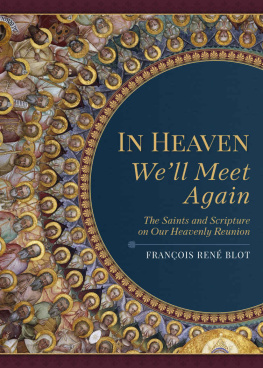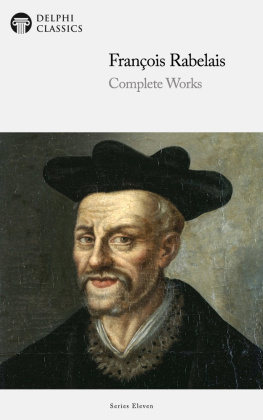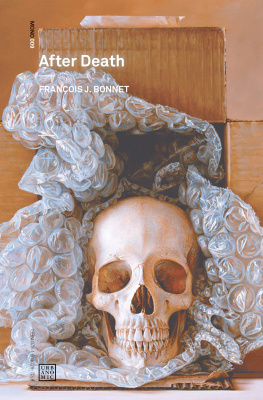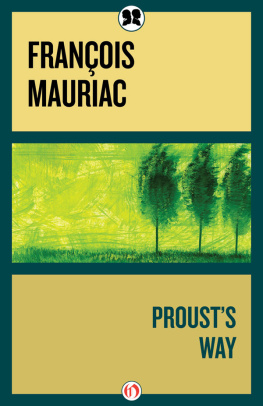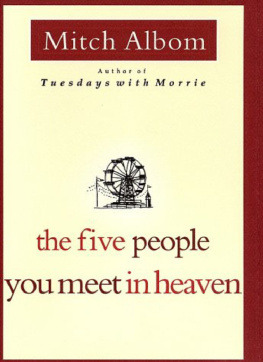Francois Rene Blot - In Heaven We’ll Meet Again
Here you can read online Francois Rene Blot - In Heaven We’ll Meet Again full text of the book (entire story) in english for free. Download pdf and epub, get meaning, cover and reviews about this ebook. year: 2016, publisher: Sophia Institute Press, genre: Religion. Description of the work, (preface) as well as reviews are available. Best literature library LitArk.com created for fans of good reading and offers a wide selection of genres:
Romance novel
Science fiction
Adventure
Detective
Science
History
Home and family
Prose
Art
Politics
Computer
Non-fiction
Religion
Business
Children
Humor
Choose a favorite category and find really read worthwhile books. Enjoy immersion in the world of imagination, feel the emotions of the characters or learn something new for yourself, make an fascinating discovery.
- Book:In Heaven We’ll Meet Again
- Author:
- Publisher:Sophia Institute Press
- Genre:
- Year:2016
- Rating:5 / 5
- Favourites:Add to favourites
- Your mark:
- 100
- 1
- 2
- 3
- 4
- 5
In Heaven We’ll Meet Again: summary, description and annotation
We offer to read an annotation, description, summary or preface (depends on what the author of the book "In Heaven We’ll Meet Again" wrote himself). If you haven't found the necessary information about the book — write in the comments, we will try to find it.
In Heaven We’ll Meet Again — read online for free the complete book (whole text) full work
Below is the text of the book, divided by pages. System saving the place of the last page read, allows you to conveniently read the book "In Heaven We’ll Meet Again" online for free, without having to search again every time where you left off. Put a bookmark, and you can go to the page where you finished reading at any time.
Font size:
Interval:
Bookmark:
Praise for This Book
Your little work is truly a pearl set in the fine gold of the doctrine of the Fathers. I have read it with profit and consolation, and I rejoice in the consolation that it will bring to souls wanting instruction on this point.
Louis douard Franois Desir Pie
Cardinal Bishop of Poitiers, France
This work deserves a distinguished place in all Christian libraries and should be on the table of every pious family that faithfully preserves and celebrates the memory of its deceased members.
Vienne Post
November 6, 1862
Your charming work is admirably adapted to console many poor, afflicted souls who, having enjoyed here below the happiness of loving their dear ones, find difficulty in conceiving that they can be happy far away from them. Your book is a good work a true act of charity.
Andr-Jean-Marie Hamon
Priest of St. Sulpice, France
For a long time, I have wished that such a book should be given to the public.
Flix Antoine Philibert Dupanloup
Bishop of Orlans, France
Franois Ren Blot, S.J.
In Heaven
Well Meet Again
The Saints and Scripture
on Our Heavenly Reunion
SOPHIA INSTITUTE PRESS
Manchester, New Hampshire
Copyright 2016 by Sophia Institute Press
In Heaven Well Meet Again was formerly published by Benziger Brothers, New York, in 1863, under the title In Heaven We Know Our Own . This 2016 edition by Sophia Institute Press includes editorial revisions.
Printed in the United States of America. All rights reserved.
Cover design by Perceptions Design Studio.
On the cover: Christ Pantocrator, Virgin Mary, angels and elect , detail from Paradise , 1375-1378, by Giusto de Menabuoi (active since 1349, died 1393), fresco, cupola, Baptistery of St. John, Padua, Veneto, Italy, fourteenth century / De Agostini Picture Library / Bridgeman Images.
Scripture passages are taken from the Douay-Rheims edition of the Old and New Testaments. Where applicable, Scripture passages have been cross-referenced with the differing names and enumeration in the Revised Standard Version, using the following symbol: RSV =.
No part of this book may be reproduced, stored in a retrieval system, or transmitted in any form, or by any means, electronic, mechanical, photocopying, or otherwise, without the prior written permission of the publisher, except by a reviewer, who may quote brief passages in a review.
Sophia Institute Press
Box 5284, Manchester, NH 03108
1-800-888-9344
www.SophiaInstitute.com
Sophia Institute Press is a registered trademark of Sophia Institute.
Library of Congress Cataloging-in-Publication Data
Title: In heaven we know our own / Francois Rene Blot, S.J.
Other titles: Au ciel on se reconnait . English
Description: Manchester, New Hampshire : Sophia Institute Press, 2016. |
Originally published: In heaven we know our own, or, Solace for the
suffering. New York : Benziger Brothers, 1863. | Includes bibliographical
references.
Identifiers: LCCN 2016003391 | ISBN 9781622823307 (pbk. : alk. paper) ePub ISBN 978-1-622823-314
Subjects: LCSH: Consolation. | Heavenly recognition. |
Heaven Christianity Meditations. | Catholic Church Doctrines.
Classification: LCC BV4905.3 .B5613 2016 | DDC 236/.24 dc23
LC record available at http://lccn.loc.gov/2016003391
E DITORS NOTE : Published in 1863 as a translation from an earlier French edition, this book at times cites as the source of its information books of which there is no present record. Occasionally, it inaccurately cites texts and passages. We have attempted to remedy these occasional deficiencies, but where we have failed, we have omitted the authors unverifiable attribution rather than risk misleading the reader.
From the Preface to the Seventh Edition
T he success of this book has itself given great joy to the sensitive soul of the person who first asked us for these Letters of Consolation. She writes:
I am certainly indebted to you for much consolation and many good desires. You are always kind enough to let me hear of the success of the work In Heaven Well Meet Again. For this I thank you with all my heart. When I think that my sighs and my tears have drawn this book from your heart, I can only admire Divine Providence, which from a grain of mustard seed, has produced a tree under whose shadow the souls of the afflicted repose.Alas! In her life, death has again lifted his sword, again snatching from this poor mother a beloved daughter. But grace lent her some resemblance to Mary, by her religious resignation:
I consecrated myself by a vow to our good Mother at the most terrible moment of my grief, and she came to my help. Although I did not remain standing, like her, at the foot of the Cross, I seated myself there, and left it not. It was she who obtained for me grace to do so.May all mothers from whom death tears a child also invoke and imitate her who beheld her only Son crucified! May all those who read this little work have recourse to the Comforter of the Afflicted and at least seat themselves at the foot of the Cross, if there they cannot stand!
Franois Ren Blot, S.J.
Paris, May 29, 1863
Letter 1
State of the Question
M adam,
Death has cruelly stricken around you the persons you loved most. Your grief is extreme, and it is lawful, even though you feel no doubt of their eternal salvation. Why should you be forbidden to mourn your nearest and dearest who sleep in the Lord, provided that, following the counsel of the Apostle, you be not sorrowful even as others who have no hope? (1 Thess. 4:12).
St. Augustine (354-430) comments on these words:
It is natural to grieve at the death of those who are dear to us, since death is abhorrent to nature, and faith teaches us that it is one of the chastisements of sin. Sorrow is a necessity when those whom we love depart from us by dying. For, although we know that they have not departed from us forever (as if we were to remain always on earth), but that they have preceded us by a little (because we are destined soon to follow them), nevertheless how shall death, taking possession of our friend, not afflict our natural affection? Let it then be permitted to loving hearts to sorrow for the death of their beloved, provided that there be a remedy for this grief, a consolation for these tears, in the joy of which faith gives us some foretaste, in rendering us confident of the fate of our dear deceased, who go only a little before us, and pass into a better life.St. Paulinus, bishop of Nola, consoled Pammachius, who had lost his wife, Paulina, daughter of St. Paula, and sister of St. Eustochium. The virtuous husband shed tears as abundantly as he dispensed alms. What will his friend do? Will he blame him for these tears? He will, on the contrary, commend him and gather from Scripture all the examples of holy tears shed at the death of a cherished friend. He will then add:
Why condemn the mourning of holy mortals? Did not Jesus Himself weep for Lazarus, whom He loved? Did He not deign to commiserate our unhappiness so far as to shed tears over one that was dead? Did He not, humbling Himself to the level of human infirmity, weep for him whom He was about to raise to life by means of His divine virtue? It is for this, O my brother, that your tears are pious and holy; for a similar affection causes them to flow; and if you weep for a worthy and chaste companion, it is not that you have doubts of the resurrection, but that your love has its regrets and its desires.In the presence of those who reproach you with your tears, open the Gospel, and, for your answer, point to the words of St. John, And Jesus wept, and again these, And he troubled himself (cf. John 11:33, 35).
It was the will of Jesus to deny Himself that solace to be found in a calm affliction; it was His will to be troubled. His divine nature permitted Him so to be, only inasmuch as He Himself concurred in this trouble; and that He did this the Gospel tells us. After such an example, let us no longer attribute to our imperfection the tears wrung from us by affliction, or the trouble into which it casts us Jesus wept, Jesus was troubled .
Next pageFont size:
Interval:
Bookmark:
Similar books «In Heaven We’ll Meet Again»
Look at similar books to In Heaven We’ll Meet Again. We have selected literature similar in name and meaning in the hope of providing readers with more options to find new, interesting, not yet read works.
Discussion, reviews of the book In Heaven We’ll Meet Again and just readers' own opinions. Leave your comments, write what you think about the work, its meaning or the main characters. Specify what exactly you liked and what you didn't like, and why you think so.

